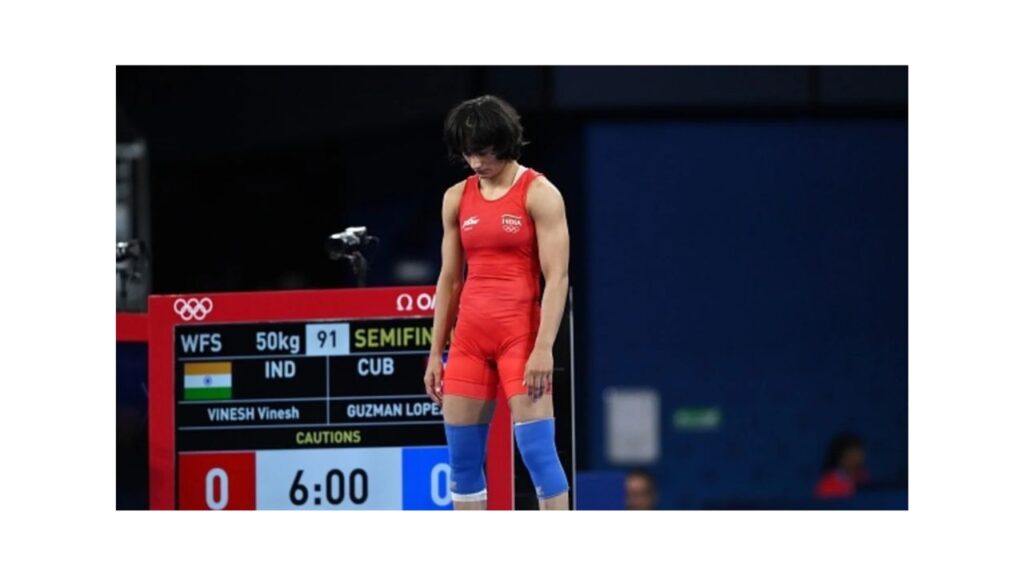A 24-page document detailing CAS’s reasoning for rejecting Vinesh Phogat’s request for an Olympic silver medal was made public.
Vinesh Phogat’s fate in the weigh-in debacle at the Paris Olympics 2024 was sealed with a single statement last Wednesday. However, the Court of Arbitration for Sport (CAS) on Monday published a comprehensive report outlining the rationale behind the court rejecting the Indian wrestler’s request for a shared silver medal after she was disqualified from the women’s 50kg freestyle final due to her weight.
Vinesh made history earlier this month when she became the first Indian woman wrestler to make it to an Olympic final at the Paris Games. But the next morning, at the traditional weigh-in, she was discovered to be 100 grams overweight, which resulted in her disqualification and denial of a medal.
Later, the 29-year-old appealed to the CAS, contesting the ruling and requesting a shared silver medal in the event. But last week, after a protracted hearing, the CAS decided in favor of the United World Wrestling and the International Olympic Committee, rejecting her appeal. On Monday, the court made available a 24-page document outlining the rationale for its decision.
The court decided that wrestlers must make sure they don’t go over their allowed weight limit, and that there is never going to be an exception.
Here’s the conclusion portion of CAS’s verdict:
- The applicant’s failure to meet the 50 kg weight limit during the second weigh-in is undeniable. Her basic argument is that this is a minor excess that can be explained by things like the menstrual cycle, water retention, the need to drink enough water, and the fact that she didn’t have enough time to lose weight before traveling to the athlete’s village.
- The weight restriction is clearly stated in the rules, which apply to all competitors, which presents an issue for the athlete. It is an upper limit, and no tolerance is given. Not even the singlet’s weight is accommodated. Athletes are obviously responsible for making sure they stay below that threshold.
- The Rules do not include any discretion that the Sole Arbitrator is required to use. The Sole Arbitrator finds strong evidence in the submissions that the consequences of the second weigh-in failure should be limited to disqualification from the event that came after it, the finals. Regretfully for the Applicant, however, this is not what the Rules specify.
- The athlete requests that the appealed decision be overturned and that either Article 11 of the rules be interpreted to only apply to the competition’s final round rather than the competition as a whole, or that the consequences specified in that article not be applied. The athlete’s failure to make the second day’s weigh-in cut is not up for debate. There is no dispute over Article 11 of the Rules. Thus, Article 11 is applicable and the decision was made legally.
- The athlete is essentially requesting that a tolerance be applied to the weight limit specified in the rules and that it be adjusted to suit her unique circumstances for the day. It was only mentioned that the athlete’s weight at the second weigh-in was within a tolerance, without providing a numerical value for the allowable tolerance. The Applicant’s issue is that the Rules don’t provide any support for this kind of accommodation. Conversely, it is explicitly stated in the Rules that the 50 kg weight limit is just that—a limit. Neither discretion nor personal accommodations are offered.
- The athlete passed the weigh-in on the first day, but she had to pass it again on the day of the final, which was the second day. She was ranked last without a rank and was removed from the competition due to the application of Article 11 of the Rules. Even though her performance on the first day of competition guaranteed that she would at least receive a silver medal, this prevents the awarding of a silver medal. She insists that her successful weigh-in on August 6, 2024, was also relevant to the competition the following day, and that she is still eligible and qualified to receive her silver medal.
- The athlete acknowledges that both gold and silver medals were given out and that, in accordance with the rules, the wrestler who lost to her in the semifinals took her place in the competition’s final round. Instead of requesting that another wrestler forfeit their medal, she goes after a second silver one. The applicant is not entitled to the relief requested by the Sole Arbitrator, which is to give the applicant a silver medal.
- It appears that the Rules are a reflection of a UWW policy requiring wrestlers to be eligible not only at the start of a competition but also throughout, from the point of entry to the championship. The Rules state that if a wrestler becomes ineligible during the competition, the penalties outlined in Article 11 take effect because there are no accrued rights resulting from partial eligibility.
- As a result, the Application is dismissed and the Sole Arbitrator declines to award the requested relief.
- The Sole Arbitrator notes that the athlete started the match, prevailed in three rounds, and advanced to the Olympic final in the 50 kg weight class in Paris before losing the second weigh-in and losing the right to compete in the final. There’s no indication that she did anything improper.
Vinesh, who declared her retirement after learning of her disqualification, returned home last week and is still unsure if she will go back to professional wrestling.
